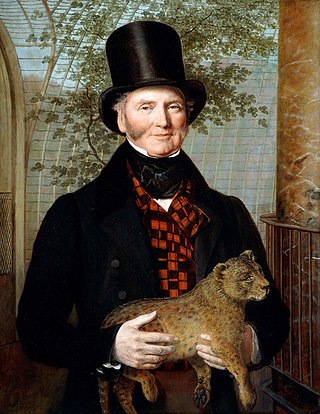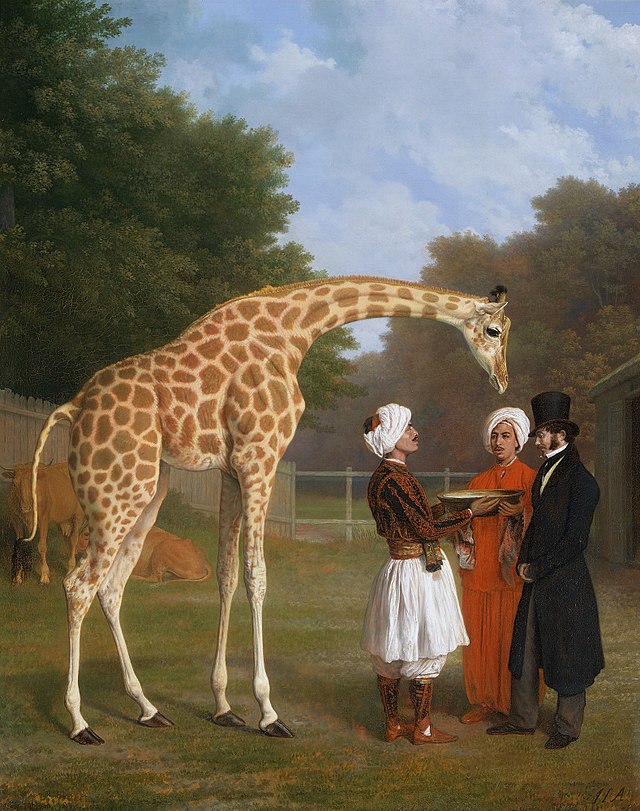Top Qs
Timeline
Chat
Perspective
Edward Cross (zoo proprietor)
English zoo proprietor and dealer (1774–1854) From Wikipedia, the free encyclopedia
Remove ads
Edward Cross (baptised 3 February 1774 – 26 September 1854) was an English zoo proprietor and dealer in animals.
This article needs additional citations for verification. (May 2024) |


Cross was born in London and baptised at St Andrew's, Holborn, presumably within days of his birth. Apart from the names of his parents, Walter Cross and Jane (née Callow), his early life remains obscure. He married Mary Herring.[when?]
Cross worked for Stephen Polito, the owner of the menagerie at Exeter Exchange in the Strand. Cross's daughter married Polito's brother, and Cross bought the menagerie after Polito's death in 1814. The menagerie had been operated at that site from 1773 in competition with the Royal Menagerie at the Tower of London with lions, tigers, monkeys, and other exotic species, all confined in iron cages in small rooms. The menagerie was primarily a visitor attraction open to the general public. It was visited by Wordsworth and Byron, the latter recorded watching the "tigers sup", being amused by a hyena's affection for its keeper, and the tricks played by an elephant with its trunk.[1]
Animals in the collection were painted by Edwin Landseer and Jacques-Laurent Agasse. It was also visited by scientists such as Joshua Brookes and J. E. Gray. Gray named the Rhinoceros crossii in his honour (now as a synonym for the Sumatran rhinoceros, Dicerorhinus sumatrensis).[2]

Cross renamed the collection the Royal Grand National Menagerie, and employed a doorkeeper who was dressed as a Yeoman of the Guard. The living conditions for the animals were so poor that negative comments were made even in the early 19th century. The situation became untenable after his elephant, Chunee, became unmanageable and killed a keeper. Chunee was finally put down by a firing squad of soldiers from Somerset House on 1 March 1826. Cross attempted to sell the collection to the new Zoological Society of London in 1826 and 1828, but the offer was refused on both occasions.[citation needed]
The Exeter Exchange was demolished in 1829, as part of general improvements to the Strand, and Cross moved the menagerie to the King's Mews near Trafalgar Square (now the site of the National Gallery). Some of the animals were sold to the new London Zoo in Regent's Park. In 1831, he sold the remaining animals to the Surrey Literary, Scientific and Zoological Institution – an institution that he had founded - for £3,500. Cross became superintendent of the new Surrey Zoological Gardens, and the animals were moved to Royal Surrey Gardens, in the grounds of Walworth Manor House in Kennington. Many of the exotic animals were housed in a large circular domed glass conservatory, 300 feet (90 m) in circumference with more than 6,000 square feet (600 m2) of glass. The collection expanded in the following years to include lions, tigers, an Indian rhinoceros, an orang-utan, and several giraffes.
Cross retired in 1844, and he died in Kennington in 1854. His wife, Mary, had predeceased him. The zoo became run down after Cross retired, and the animals were sold off in 1856, to be replaced by Surrey Music Hall.[citation needed]
Remove ads
References
Sources
See also
Wikiwand - on
Seamless Wikipedia browsing. On steroids.
Remove ads
